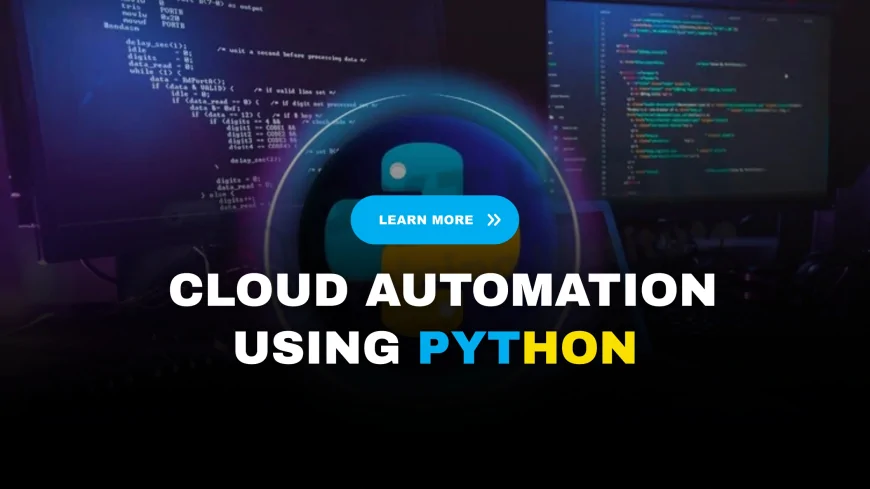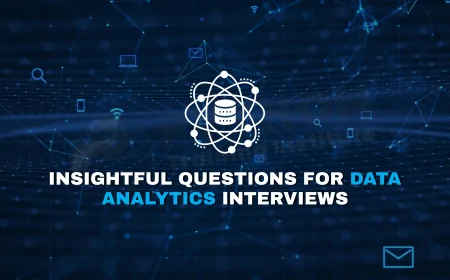Cloud Automation Using Python: Best Course in Pune | Best Cloud Automation Courses in Pune Using Python
Discover the best Cloud Automation using Python course in Pune. Learn automation with AWS, Azure, DevOps tools, real projects & certifications.

Table of Contents
- Introduction
- What is Cloud Automation?
- Why Use Python for Cloud Automation?
- Skills You Will Learn
- Top Training Institutes in Pune
- Syllabus and Course Structure
- Real-World Projects Covered
- Certification Opportunities
- Career Scope After the Course
- Online vs Offline Training in Pune
- Eligibility and Prerequisites
- Fees and Duration
- Student Reviews and Testimonials
- Tips to Choose the Best Course
- FAQs
- Conclusion
Introduction
Cloud automation is revolutionizing the IT industry, and Python has emerged as the go-to language to automate cloud environments efficiently. If you are in Pune and looking to upgrade your career in DevOps, cloud engineering, or system administration, enrolling in a Cloud Automation using Python course in Pune can be your game-changer.
What is Cloud Automation?
Cloud automation is the process of using scripts and tools to automate cloud-based tasks, such as server provisioning, application deployment, infrastructure management, and scaling. It eliminates manual intervention and ensures consistency, speed, and reliability across cloud platforms like AWS, Azure, and Google Cloud.
Why Use Python for Cloud Automation?
Python is preferred for cloud automation due to its simplicity, wide library support (like boto3 for AWS), and strong integration with DevOps tools (Terraform, Ansible, Jenkins). Python allows automation of tasks such as:
- Launching and managing EC2 instances
- Creating and deleting S3 buckets
- Automating infrastructure as code (IaC)
- Integrating with CI/CD pipelines
Skills You Will Learn
This course equips you with:
- Python scripting fundamentals
- AWS SDK (boto3) usage
- REST API integration
- Automation of multi-cloud environments
- Shell scripting and DevOps tools
- Infrastructure provisioning using Python
Top Training Institutes in Pune
Here are the best places in Pune offering cloud automation with Python:
- WebAsha Technologies – Project-based learning with AWS & Azure hands-on,Offers Python + DevOps combo with cloud labs,Flexible batch timings with placement support.
Syllabus and Course Structure
A typical course includes:
- Introduction to Python for automation
- Cloud computing fundamentals (AWS, Azure, GCP)
- Writing automation scripts using Python
- Using APIs and SDKs for cloud platforms
- Integrating Python with tools like Ansible, Terraform
- Monitoring and alerting automation
Real-World Projects Covered
Expect to work on:
- Automated EC2 provisioning and health checks
- Scheduled backups of S3 to Glacier
- Serverless application deployment using AWS Lambda
- Auto-scaling group management scripts
Certification Opportunities
Courses often prepare you for:
- AWS Certified DevOps Engineer
- Microsoft Azure Administrator Associate
- Google Professional Cloud DevOps Engineer
- Python Automation Certificate (course-specific)
Career Scope After the Course
After completing cloud automation using Python, you can apply for:
- Cloud Automation Engineer
- DevOps Engineer
- Cloud Infrastructure Engineer
- Site Reliability Engineer (SRE)
Expected salary: ₹6–15 LPA depending on your experience.
Online vs Offline Training in Pune
Most institutes offer both modes. Offline training offers personal mentoring and labs. Online training provides flexibility and self-paced learning. Choose based on your schedule, learning style, and budget.
Eligibility and Prerequisites
This course is ideal for:
- IT professionals with basic Python knowledge
- Cloud aspirants with Linux skills
- DevOps engineers looking to upskill
- Graduates looking for a job in automation
Fees and Duration
Duration: 6–10 weeks Fees: ₹12,000 – ₹25,000 depending on the institute and training mode Includes projects, cloud credits (in some cases), and placement support.
Student Reviews and Testimonials
"WebAsha’s Cloud Automation using Python course was a turning point in my career. The trainers were industry professionals who focused on hands-on AWS projects using Python and Boto3. The placement assistance helped me crack interviews at top MNCs. Highly recommended for serious learners!"
"As a fresher, I was looking for practical experience. WebAsha provided real-world cloud automation scenarios, including EC2 and S3 scripting, which made learning both fun and useful. The labs were excellent and gave me confidence to deploy live services."
"The Python scripting part was very detailed, and I finally understood how to automate AWS infrastructure. The trainers at WebAsha also guided us with interview questions and DevOps tool integrations like Terraform and Jenkins."
Tips to Choose the Best Course
- Check trainer experience in real-world cloud projects
- Ensure access to cloud labs (AWS free tier or Azure sandbox)
- Verify placement support and reviews
- Go for a project-oriented course, not just theory
Frequently Asked Questions (FAQs)
1. What is cloud automation using Python?
Cloud automation using Python involves writing scripts to automate cloud-related tasks such as provisioning servers, managing storage, deploying applications, and monitoring infrastructure on platforms like AWS, Azure, and GCP.
2. Why is Python widely used for cloud automation?
Python is popular because of its simple syntax, vast libraries like boto3 (for AWS), and seamless integration with automation and DevOps tools. It reduces manual effort and increases consistency in cloud operations.
3. Do I need prior coding knowledge to join this course?
Basic understanding of Python is beneficial. However, many training centers in Pune start with Python fundamentals before moving to advanced automation topics.
4. Which cloud platforms are covered in the course?
Primarily AWS is covered, but some institutes also include Azure and Google Cloud depending on the course structure and demand.
5. What tools are integrated with Python in cloud automation?
Common tools include Terraform, Ansible, Jenkins, Docker, Git, and cloud SDKs like boto3 for AWS, Azure SDK for Python, and Google Cloud client libraries.
6. Is WebAsha Technologies good for this course?
Yes, WebAsha is among the top-rated institutes in Pune for cloud automation using Python. They offer hands-on labs, real-world projects, and career support.
7. How long does the course typically last?
Most cloud automation courses in Pune are 6 to 10 weeks long, depending on whether you choose weekday or weekend batches.
8. What is the average course fee in Pune?
The fee typically ranges from ₹12,000 to ₹25,000, depending on the institute, mode (online/offline), and included certifications or projects.
9. Will I get hands-on experience with real cloud projects?
Yes, top institutes like WebAsha provide practical projects such as EC2 provisioning, auto-scaling setup, S3 backups, and Lambda function automation.
10. Are any certifications included in the course?
Many institutes provide course completion certificates. Some also prepare you for global certifications like AWS Certified DevOps Engineer or Azure Administrator.
11. What are the career options after this course?
You can work as a Cloud Automation Engineer, DevOps Engineer, Site Reliability Engineer (SRE), or Infrastructure Developer.
12. Can I get placed after completing the course?
Yes, institutes like WebAsha offer placement support, resume building, mock interviews, and job referrals.
13. Is online training available in Pune?
Yes, most institutes now offer live online and hybrid training modes to suit working professionals and students.
14. Do I need to have cloud experience to join?
No, beginners are welcome. Courses usually start with cloud basics and progressively move to automation using Python.
15. What is boto3, and why is it important?
Boto3 is the official AWS SDK for Python. It allows you to automate AWS services like EC2, S3, IAM, and CloudWatch using Python scripts.
16. Will I learn DevOps as part of this course?
Many courses include DevOps concepts and tools like CI/CD pipelines, version control, containerization, and infrastructure as code (IaC).
17. Can I freelance or work remotely after this course?
Yes, cloud automation skills are highly in demand worldwide. You can work remotely or take freelance projects in DevOps and cloud automation.
18. What systems or tools do I need to practice at home?
A basic laptop with Python installed and internet access is enough. Most cloud platforms offer free tiers for practicing automation.
19. Is this course suitable for system administrators?
Absolutely. System administrators can upskill into cloud roles by learning automation, scripting, and cloud-native tools.
20. How do I choose the best training institute in Pune?
Check for experienced trainers, real project exposure, student reviews, placement support, and cloud lab access. WebAsha is a top choice due to its comprehensive syllabus and mentorship.
Conclusion
If you're aiming for a successful career in cloud automation and DevOps, choosing a Python-based Cloud Automation course in Pune is one of the smartest investments. With hands-on labs, industry-recognized certifications, and strong placement support, Pune’s leading institutes are well-equipped to turn your aspirations into a high-paying job in tech.
What's Your Reaction?
 Like
0
Like
0
 Dislike
0
Dislike
0
 Love
0
Love
0
 Funny
0
Funny
0
 Angry
0
Angry
0
 Sad
0
Sad
0
 Wow
0
Wow
0















